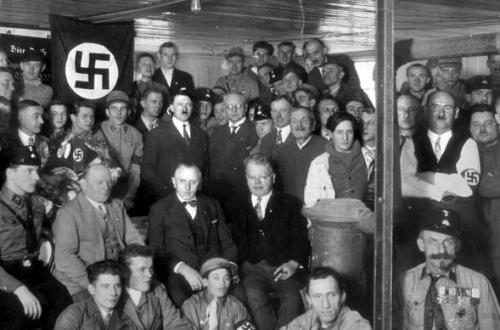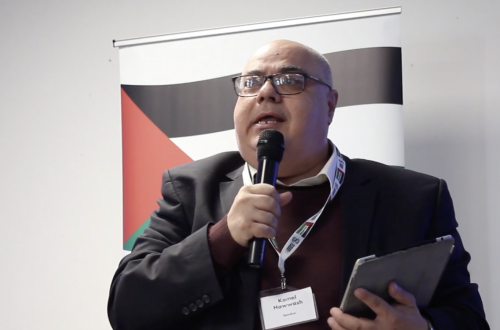Until very recently, both Hamas and Palestinian Islamic Jihad had leadership bases in Damascus.
In early 2012, shortly after Hamas officers attacked Shia worshippers in Gaza, the BBC reported that Hamas’ leaders would move out of Syria, to Egypt and Qatar.
On Friday, the head of the Hamas government in Gaza, Ismail Haniya, declared his support for Syrian people against President Bashar al-Assad.
“I salute all people of the Arab Spring, or Islamic winter, and I salute the heroic people of Syria who are striving for freedom, democracy and reform,” Ismail Haniya told worshippers at a mosque in Cairo.
The worshippers shouted back: “God is great” and “Syria! Syria!”
A few months later, Palestinian Islamic Jihad also moved its leadership out of Syria – to Iran:
Ziyad Nakhalah, deputy secretary general of the Islamic Jihad, has been in Iran for weeks and only visited Syria recently to transport the body of Salim Hamadah, member of the Political Bureau of the Islamic Jihad, to Lebanon where he was buried in Sidon after he died in Syria from an undisclosed illness.
The sources also revealed that this is also the case with the movement’s secretary general, Ramadan Shallah, who is moving between the two countries, while spending most of his time in Iran. The Islamic Jihad leaders travel in and out of Syria with great freedom, unlike their counterparts in the Hamas movement whose ties with the Syrian regime soured, after its leader, Ismail Haniyah, declared his support for the Syrian people in a visit to Al-Azhar.
However, an official source in the Islamic Jihad movement in Gaza denied that its officials have left Syria. The source told Asharq Al-Awsat that “the movement cannot in these difficult circumstances be anywhere expect with its brothers in Syria.” The source added that the movement is carrying out relief programs for the Palestinian refugees in Syria, and that some officials have left Syria within the framework of work abroad, but that their departure was not permanent.
The source went on to say that, “relations between the Islamic Jihad and the Syrian government are excellent, unlike Hamas, which prefers to be based outside Syria.” Islamic Jihad is maintaining its relations with the Syrian and Iranian regimes, and has refrained from criticizing Al-Assad and from supporting the Syrian revolution, which is different from its stand towards the Egyptian, Tunisian, and Libyan revolutions.
The sources emphasized that the departure of the movement’s leaders to Iran does not mean a change in its stand towards the Syrian regime; however, the political circumstances in Damascus has forced the Islamic Jihad leaders to work from another base.
Syria has been a strong advocate of the Islamic Jihad movement and has hosted it for many years, as was the case with the Hamas movement; however, Hamas’s links to the Muslim Brotherhood, which stand as an arch enemy of the Baathist Syrian regime, has expedited the fall-out between Damascus and Hamas after the latter refused to openly support Assad and adopted a biased stand toward the Syrian revolution. Syria also constitutes an important passageway for the Islamic Jihad leaders and elements that travel from Gaza to Teheran for different political and logistical reasons.
Last week the Times of Israel reported on Hamas establishing a 600-man anti-rocket patrol force. Days later, a PIJ leader in charge of a rocket-firing unit was shot dead by Hamas. Haaretz analyses the recent rocket fire into Israel as evidence of PIJ “settling a score” with Hamas:
In the past, Islamic Jihad has reacted to internal conflicts with Hamas by trying to increase tension with Israel along the Gaza border. But Israel seems sure that Hamas is not interested in escalation along the border, especially as Hamas has attempted to calm the situation since Sunday night. Thus, Israel restricted its responses to an aerial attack on a weapons cache, and an Islamic Jihad command center, while also temporarily closing border crossings. In addition, Israel stated that it will hold Hamas responsible for restoring the relative quiet, as the governing body in Gaza.
Whilst tensions mounted between their two group, Salafis stepped up their protests against Hamas, for what they claim to be unlawful detentions, illegal torture and various other “continuous violations” by the ruling force in Gaza.
There has been much media focus recently on the spillover from the Syrian Civil War in Lebanon, particularly in the south and in the Beqaa Valley. As Hamas is counselled by Qatar and Egypt, whilst PIJ takes shelter in Iran, there may soon be journalistic interest in the ripple effect that events in Syria are causing in Gaza.


